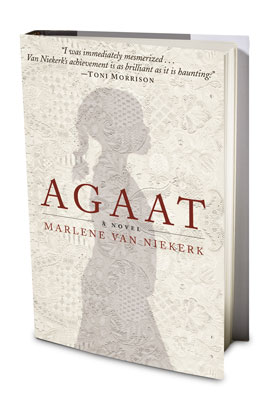Reading Questions for Agaat
Warning: May contain spoilers

Photo: Ben Goldstein/Studio D
1. When we encounter Milla in the present, she's condemned to silence by ALS, a motor neuron disease. As she contemplates her life and mines her memories, do you think she's proud of the life she's led?
2. Agaat is told nonlinearly; what do you think van Niekerk can accomplish with that structure that wouldn't be possible otherwise?
3. Milla's relationship with Agaat changes rather drastically after Jakkie is born. How does Agaat handle the changes?
4. Milla's farm is called Grootmoedersdrift, which translates to Grandmother's Crossing or Grandmother's Drift. It had been passed down through the women in Milla's family; how would you describe the relationship between Milla and her mother? Do you see any similarities between their relationship and Milla's relationship with Agaat?
5. In what ways do you feel Agaat is an allegory for apartheid? Discuss.
6. We only see Jak, Milla's husband, through Milla's eyes. Were you able to find him sympathetic at all?
7. As close as Milla's son, Jakkie, and Agaat once were, in the end he thinks of her as an "Apartheid Cyborg. Assembled from loose components plus audiotape." What do you think he means?
8. Agaat's position in the home creates strained relationships with the other servants on the farm, leaving Agaat not fully part of their world nor the world of the white farm owners. Do you think Agaat is resentful of her position?
9. The author has in interviews describes Milla as a "vampire." Does this seem fair to you? Why or why not?
10. When Agaat takes over the farm, what can you imagine her doing differently?
Read O's review
Get more reading guides
2. Agaat is told nonlinearly; what do you think van Niekerk can accomplish with that structure that wouldn't be possible otherwise?
3. Milla's relationship with Agaat changes rather drastically after Jakkie is born. How does Agaat handle the changes?
4. Milla's farm is called Grootmoedersdrift, which translates to Grandmother's Crossing or Grandmother's Drift. It had been passed down through the women in Milla's family; how would you describe the relationship between Milla and her mother? Do you see any similarities between their relationship and Milla's relationship with Agaat?
5. In what ways do you feel Agaat is an allegory for apartheid? Discuss.
6. We only see Jak, Milla's husband, through Milla's eyes. Were you able to find him sympathetic at all?
7. As close as Milla's son, Jakkie, and Agaat once were, in the end he thinks of her as an "Apartheid Cyborg. Assembled from loose components plus audiotape." What do you think he means?
8. Agaat's position in the home creates strained relationships with the other servants on the farm, leaving Agaat not fully part of their world nor the world of the white farm owners. Do you think Agaat is resentful of her position?
9. The author has in interviews describes Milla as a "vampire." Does this seem fair to you? Why or why not?
10. When Agaat takes over the farm, what can you imagine her doing differently?
Read O's review
Get more reading guides



